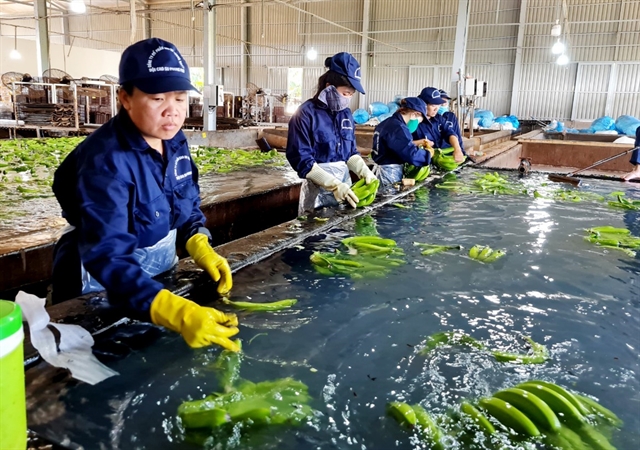 Economy
Economy

 |
| Workers of Thống Nhất Rubber Joint Stock Company, Bà Rịa - Vũng Tàu Province. In order to be able to participate in global supply chains, Vietnamese firms must prove the compliance with sustainable development standards, including international labour standards. — VNA/VNS Photo Hồng Đạt |
HÀ NỘI — Vietnamese enterprises should develop solutions to comply with international labour standards to be able to participate in global support chains and promote export sustainability, experts have said.
Việt Nam participated in and negotiated 17 free trade agreements (FTAs), four of which contained labour commitments and were classified as “new generation”, including the FTA between Việt Nam and Eurasian Economic Union (VN-EAEU), Comprehensive and Progressive Trans-Pacific Partnership (CPTPP), EU – Việt Nam FTA (EVFTA) and the UK – Việt Nam FTA (UKVFTA).
Đặng Đức Anh, Deputy Director of the Central Institute for Economic Management (CIEM), said that FTAs allowed Vietnamese export goods to enjoy preferential tariffs when entering more than 50 markets, including most major trade partners, accounting for over 70 per cent of the country’s total export revenue.
Despite bringing opportunities for increasing trade exchanges, new-generation FTAs attach special importance to sustainable development goals, including labour standards, Anh said.
Nguyễn Minh Thảo, Head of CIEM’s Business Environment and Competitiveness Research Department, said that although the level of labour commitments in FTAs was different, there was compliance pressure on Vietnamese enterprises.
“In order to be able to participate in global supply chains, Vietnamese firms must prove compliance with sustainable development standards, including international labour standards,” Thảo said.
Thảo said that besides the compliance pressure, the requirement for sustainable development was pushing enterprises to increase competitiveness to have the opportunity to participate in the global supply chains.
Trần Thị Hồng Liên from Việt Nam Chamber of Commerce and Industry said that complying with international legal regulations was the responsibility and obligation of enterprises.
Liên said that labour regulations of Việt Nam were being improved to approach international commitments and FTAs’ requirements, adding that complying with international labour standards could also help strengthen the position of enterprises when exporting as international partners were paying increasing attention to this issue.
Phan Thị Thanh Xuân, General Secretary of Việt Nam Leather Footwear and Handbag Industry, said that complying with international standards might not be a big problem for large-scale or foreign-invested enterprises but it would be to small and medium-sized enterprises (SMEs) and newcomers who would be in need of support and consultancy.
From a macro-economic viewpoint, Nguyễn Đình Cung, former CIEM’s Director, said that the figure that 75 per cent of export value belonged to foreign-invested enterprises indicated that the FDI sector was taking opportunities from FTAs better than domestic enterprises.
The limitations of domestic enterprises were the shortage of capacity and lack of market information, Cung said, adding that a specialised team should be established to provide support to enterprises and help them comply with international requirements.
In addition, enterprises which had undergone labour standards assessments by their partners should be exempt from similar inspections by the management agencies, Cung said.
According to Thảo, it was necessary to hasten reforms and improve the business environment towards international practice, internalise international commitments ensure effective implementation.
The focus should be on reducing compliance cost and enhancing competitiveness for domestic enterprises, she said. — VNS